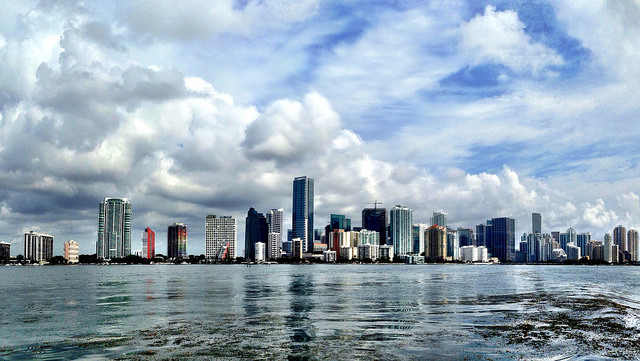The City of Miami submitted a bid to become home to Amazon’s second headquarters, with the help of the University of Miami.
UM, along with Miami-Dade College and Florida International University, worked with the city’s Beacon Council – Miami-Dade County’s official economic development partnership – to submit a proposal to delivery giant Amazon Oct. 18.
Provost and Executive Vice President Jeffrey Duerk said the university was part of an academic commission alongside other Florida schools that produced information to submit in the proposal. The university’s main role was to provide data to appeal to Amazon on what the city and university can offer the company, Duerk said.
He said the university “crafts talent” from which Amazon could benefit.
“The quality of our students and academic programs is what makes us competitive,” Duerk said.
For Gabriel Wadsworth, a graduate student studying finance, Miami becoming Amazon’s second home base would be an opportunity for students like himself.
“It’ll be amazing for the economy,” Wadsworth said. “If Amazon has a big office, it’ll benefit the university in students actually being able to get jobs and also for the surrounding community. It’ll be a lot of high paying jobs.”
Amazon’s proposal submission deadline was Oct. 19, and the company received 238 proposals from cities across North America, including Chicago and Atlanta. Seattle is currently home to Amazon’s only headquarters. According to the Amazon HQ2 website, the company’s investments in Seattle have generated “an additional $38 billion to the city’s economy” in six years.
Amazon said it’s expected to invest over $5 billion in construction and create an estimated 50,000 “high-paying” jobs in its HQ2 city.
In September, Amazon released its preferred criteria, which included “a metropolitan area with more than one million people,” “a stable and business-friendly environment” and “urban or suburban locations with the potential to attract and retain strong technical talent.”
UM President Julio Frenk was a part of the academic council alongside Duerk. Frenk said it’s the city’s location that sets it aside from any other in North America.
“It’s one of the most global cities in the United States,” Frenk said. “It is, of course, at the crossroads of the Americas, but beyond that, it’s on the Eastern Seaboard … It’s one of the most cosmopolitan cities in the United States.”
Though Amazon started as an internet-based retailer, it has turned its attention to technological advancement. In 2016, the company introduced Amazon Prime Air. The new service provided customers orders within 30 minutes. The deliveries were made using drones – a first for an online retail company.
For Frenk, Amazon’s innovative vision would pair well with a research university like the UM.
“Every successful innovation hub has a comprehensive research university, and that university is the University of Miami,” Frenk said. “It’s just a very rich ecosystem that offers a lot of global company that obviously focuses on technological innovation like Amazon.”
Amazon is expected to make its final decision in 2018.
“The mix of the most privileged geographical location … With a strong business and government and civic leadership, our own innovation and the presence of a top 50 research university like ours, I think makes a very compelling case,” Frenk said.
Featured photo courtesy Flickr user Ines Hegedus-Garcia.







